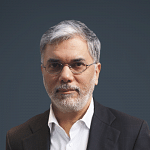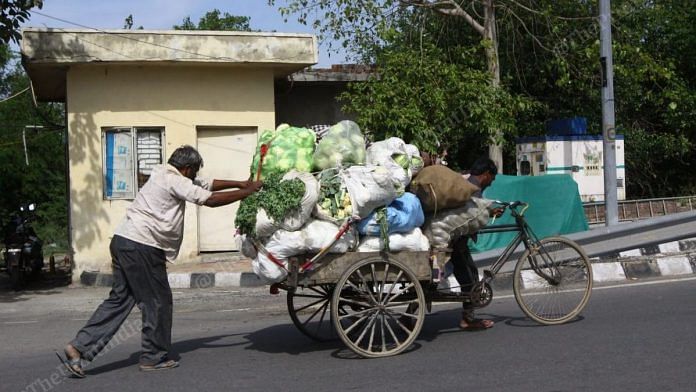
 Covid-19: What India has done right and what next
Covid-19: What India has done right and what next
Amitabh Kant | CEO, Niti Aayog
Sarah Iype | Young professional, NITI Aayog Hindustan Times
Kant and Iype assert that the way India battles Covid-19 will determine how the future unfolds for the world. They maintain that Indian government’s policy responses to Covid-19 have been “stellar” and have evolved to “precision” from “precaution and prevention”. Moreover, the coordination between a “proactive political leadership”, an “agile bureaucracy” and the “supportive public” has led to some semblance of life coming back to normal. However, they note, “Despite the easing of restrictions, there is a need to remain vigilant, as the battle against coronavirus will have to continue to be fought by each citizen, through self-discipline, wearing of masks, and social distancing.”

 A shot of hope with a game changing vaccine
A shot of hope with a game changing vaccine
Dr T. Jacob John | Retired Professor of Virology, CMC Vellore
Dr Prathap Tharyan | Adjunct Professor, Clinical Epidemiology Unit, Christian Medical College, Vellore
The Hindu
Apart from infection-control, John and Tharyan argue that a plan of action to “mitigate suffering” and “stimulate economic recovery” is urgently needed. Moreover, they assert that effective treatments to reduce Covid-19 related deaths may emerge, but a social vaccine is also required. A social vaccine can build “societal immunity” to the horrifying effects of a future pandemic such as stigma and discrimination. The authors explain, “A social vaccine is a metaphor for a series of social and behavioural measures that governments can use to raise public consciousness about unhealthy situations through social mobilisation.” They note, “A social vaccine also requires people to hold leaders accountable to invest in: rapidly scaling-up testing; meeting the basic and economic needs of vulnerable sections; providing psychological support where needed; not communalising or politicising the pandemic; providing adequate personal protective equipment (PPE) to front-line workers in health.”
 Language of war against virus has exacerbated the situation for Muslims
Language of war against virus has exacerbated the situation for Muslims
Apoorvanand | Teaches Hindi, Delhi University
The Indian Express
Apoorvanand maintains that India must “introspect and not feel outraged” when international bodies advise it to stop the stigmatisation of those infected by Covid-19 on the basis of religion. Moreover, instead of addressing “deep-seated” Islamophobia, many in India are “advising” Muslims to behave as “good Muslims and good citizens”. He suggests that we need to mobilise our “scientific and spiritual resources” from all traditions to meet the challenges that the virus poses. Moreover, we can’t afford to be “petty and vicious towards others”.

 Telephone survey shows high understanding of social distancing, support for lockdown
Telephone survey shows high understanding of social distancing, support for lockdown
Sonalde Desai | Director, NCAER National Data Innovation Centre
Santanu Pramanik | Deputy director, NCAER National Data Innovation Centre
The Indian Express
Desai and Pramanik suggest that educating people about identifying key symptoms of coronavirus and identifying conditions under which treatment can be sought must become an important part of future communications strategy. A recently completed Delhi National Capital Region Coronavirus Telephone Survey (DCVTS) by the National Council of Applied Economic Research (NCAER) taken to map out people’s understanding of coronavirus found that support for the lockdown remains high. Moreover, individuals stand ready to fight the virus despite their personal situation.
 The slog overs are here and we need mighty fiscal heaves now
The slog overs are here and we need mighty fiscal heaves now
Sandipan Deb | Former editor of ‘Financial Express’, and founder-editor of ‘Open’ and ‘Swarajya’ magazines
Mint
The government may be lifting some lockdown restrictions to allow certain economic activities but this is not enough, argues Deb. PM Modi might choose saving lives over livelihoods, but in India for many livelihoods are lives, and “destitution, stress, suicide and crime” could end up causing more death than the epidemic. Modi has appealed to employers not to retrench staff and to continue paying wages, but a “job bloodbath” has already begun across different industries even in the biggest companies, he notes. Even the middle class, on whom India “depends for consumption and economic growth”, doesn’t have huge cash savings and will find it hard to survive beyond six months without a regular monthly income. The government needs to implement big thinking to fix this crisis, he writes.
 Will more foreign financing be needed?
Will more foreign financing be needed?
Ajay Shah | Professor at National Institute of Public Finance and Policy, New Delhi
Business Standard
Shah explains that capital inflow into India is the “gap between investment and savings”, and asks what this might look like for the year 2020 and 20201. Both household savings and corporate earnings are likely to go down, which means tax payments will reduce. The use of a scheme like National Rural Employment Guarantee Scheme (NREGS) will also go up. Hence, overall savings will decline, but investment is likely to reduce even more than savings, which means the current account deficit will rise. Policy makers need to reform the current “licence/permit/raid raj” and ease financial regulations, taxation and capital controls, as financial innovation is required to connect foreign capital to India.
 What will be the new normal?
What will be the new normal?
Sunita Narain | The writer is at the Centre for Science and Environment
Business Standard
Narain argues that everytime the world faces a catastrophic event, the focus is on immediate solutions and not on lessons for the future.World leaders and institutions should have acted together, but they did not not. China was not prompt in sharing information, nor was the WHO swift or assertive enough in its action. The UN Security Council also met very late. Apart from this, all countries demonstrated a kind of “dog-eat-dog world” attitude, only caring for themselves and competing for medicine supplies and “pirating” protective equipment. This virus gew because we live in such an interconnected world, and we will not win unless we win together, writes Narain. Just like Covid-19, climate change also needs global leadership and cooperative agreement.
Today’s Editorials
The Times of India: The modification in India’s FDI policy raising the barriers for Chinese investors is a ‘prudent step with changed context’, writes TOI. The unresolved border issues with China, it’s frequent support to Pakistan in international forum undermines our fight against cross-border terrorism. The Covid-19 fallout has also served to highlight India’s vulnerability, it says. Chinese competition killed our domestic manufacturing of key active pharmaceutical ingredients.
Hindustan Times: The daily points out the irresponsible behaviour of some of the world leaders disregarding social distancing protocols. US president Trump asked his supporters to liberate the Democratic states of Virginia, Michigan and Minnesota, Brazil’s President Jair Bolsanaro has sacked his health minister who is an advocate of social distancing and isolation and Pakistan has allowed conditional congregations in mosques. These are not just internal affairs, but the consequences would be global, writes HT.
The Indian Express: The daily says that concerted efforts are required to ensure proper marketing of the rabi wheat, mustard, pulses and other harvested crops during the lockdown. It also suggests that procurement can also be done at village, schools, panchayat offices, primary cooperative societies, district courts and other unused public places during lockdown instead of only mandis. Urgent planning of kharif crops should also be done and farmers should be allowed to sell produce to anyone and anywhere, it suggests.
With inputs from Unnati Sharma



